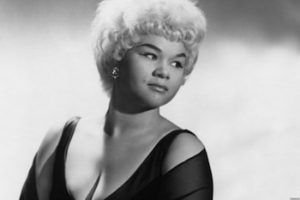
Etta James
*Etta James was born on this date in 1938. She was a Black singer.
Jamesetta Hawkins was Born Jamesetta Hawkins in Los Angeles to 14-year-old Dorothy Hawkins. Her father was white and has never been identified, but James speculated that he was the pool player Rudolf "Minnesota Fats" Wanderone. As a child, James lived with a series of caregivers. She received her first professional vocal training at the age of five from James Earle Hines.
He was the music director of the Echoes of Eden choir at the St. Paul Baptist Church in Los Angeles. In 1950, her caregiver, Mama Lu, died, and James' birth mother took her to the Fillmore district in San Francisco. James began listening to doo-wop within a couple of years and was inspired to form a girl group called the Creolettes. The 14-year-old girls met musician Johnny Otis. Otis took the group under his wing, helping them sign with Modern Records and changing their name to the Peaches. He gave the singer her stage name, reversing Jamesetta into Etta James.
She recorded and co-authored "Dance with Me, Henry" in 1954. Later that year, the song reached number one on the Hot Rhythm & Blues Tracks chart, and the group had an opening spot on Little Richard's national tour. After leaving the Peaches, James had another R&B hit with "Good Rockin' Daddy." When her contract with Modern ended in 1960, she signed with Leonard Chess' namesake label, Chess Records. Shortly afterward, she got involved in a relationship with singer Harvey Fuqua, founder of the doo-wop group The Moonglows.
Her debut album, At Last!, was released in late 1960 and was noted for its varied choice of music, from jazz standards to blues numbers to doo-wop and R&B. The album included James' future classics, "I Just Want to Make Love to You" and "A Sunday Kind of Love." In early 1961, James released her signature song, "At Last," which reached number two on the R&B chart and 47 on the Billboard Hot 100. It has become the most remembered version of the song.
James's career began to soar after signing with Chicago's Chess Records in 1960. She knew how to rock a house and did so with such gospel-charged tunes as "Something's Got a Hold On Me" in 1962 and "In The Basement" in 1966. In 1967, Chess took her to the Fame studios to record with the Muscle Shoals house band. The collaboration resulted in the triumphant Tell Mama album. James continued to work with Chess throughout the 1960s and early 1970s. James encountered a string of legal problems during the early 1970s due to her heroin addiction. She was continuously in and out of rehabilitation centers. Her husband, Artis Mills, whom she married in 1969, accepted responsibility when they were both arrested for heroin possession and served a 10-year sentence. He was released from prison in 1982 and was still married to James. In 1974, James was sentenced to drug treatment instead of serving time jailed. In 1988, at 50, she entered the Betty Ford Center in Palm Springs, California, for treatment.
James has two sons, Donto and Sametto. Both started performing with their mother in 2003 – Donto on drums and Sametto on bass guitar. The story of the early days of Chess Records was brought to the big screen as Cadillac Records in 2008, with singer Beyoncè Knowles playing James in the film. Beyoncè also recorded her version of James's signature song, "At Last," for the soundtrack. While James publicly supported the film, she was reportedly miffed when Beyoncè sang the song at President Obama's inaugural ball in January 2009.
She is regarded as helping bridge the gap between rhythm and blues and rock and roll and won six Grammy's and seventeen Blues Music Awards. She was inducted into the Rock & Roll Hall of Fame in 1993, the Blues Hall of Fame in 2001, and the Grammy Hall of Fame in 1999 and 2008. In 2010, she received treatment for a dependency on painkillers as her addiction continued. During that time, her son Donto revealed that James was diagnosed with Alzheimer's.
In 2011, she had been in and out of the hospital three times with a urinary tract infection and blood infection. On December 16, 2011, it was announced that she was "in the final stages of leukemia" and had been diagnosed with dementia and Hepatitis C. She was placed on oxygen, received constant care from her husband, and was visited regularly by her sons.
Etta James died on January 20, 2012. Rolling Stone ranked James number twenty-two on their list of the 100 Greatest Singers of All Time and number sixty-two on the list of the 100 Greatest Artists.
ASCAP Biographical Dictionary
R. R. Bowker Co., Copyright 1980
ISBN 0-8351-1283-1
Heart & Soul
A Celebration of Black Music Style in America 1930-1975
by Merlis Davin Seay, forward by Etta James
Copyright 2002, Billboard Books
ISBN 0-8230-8314-4